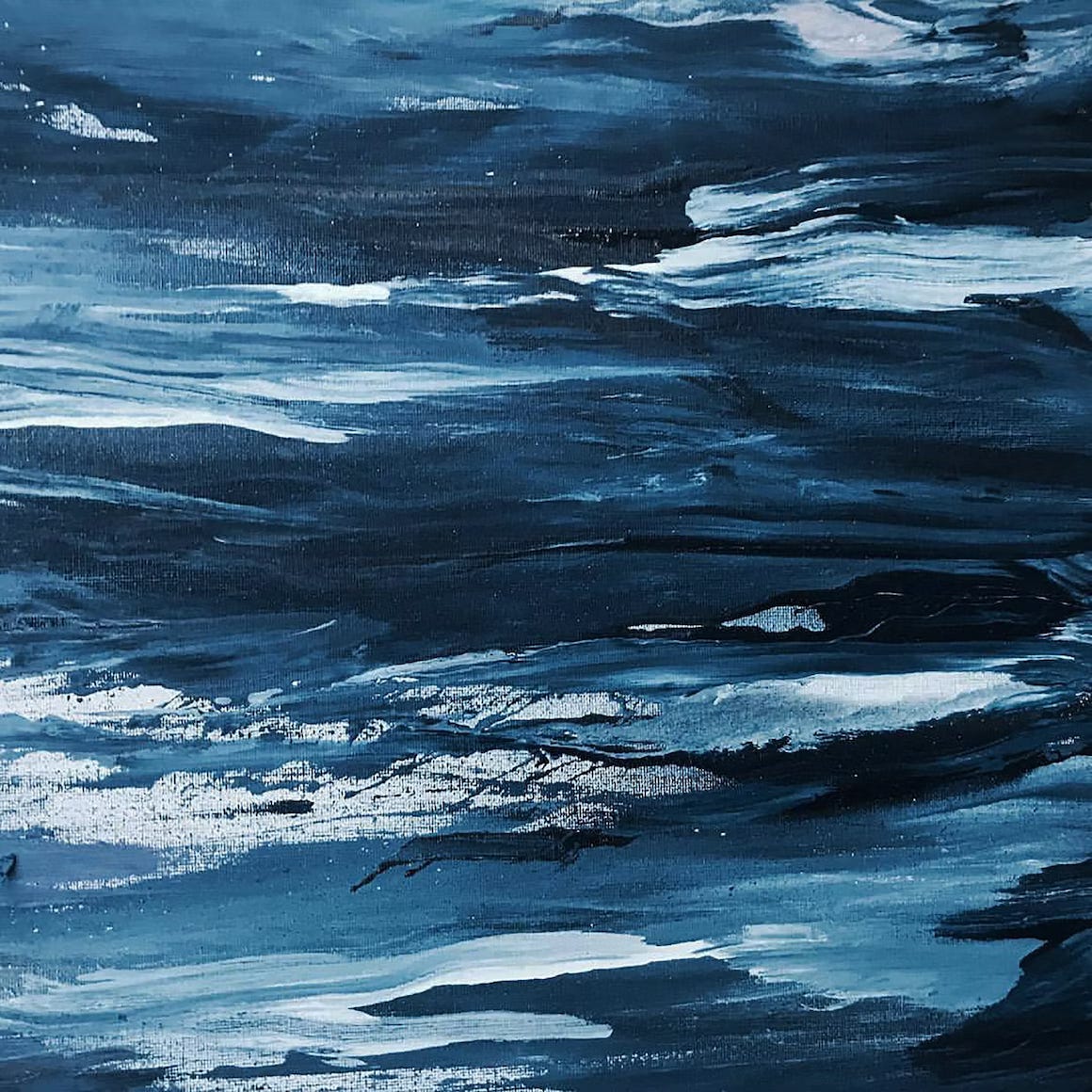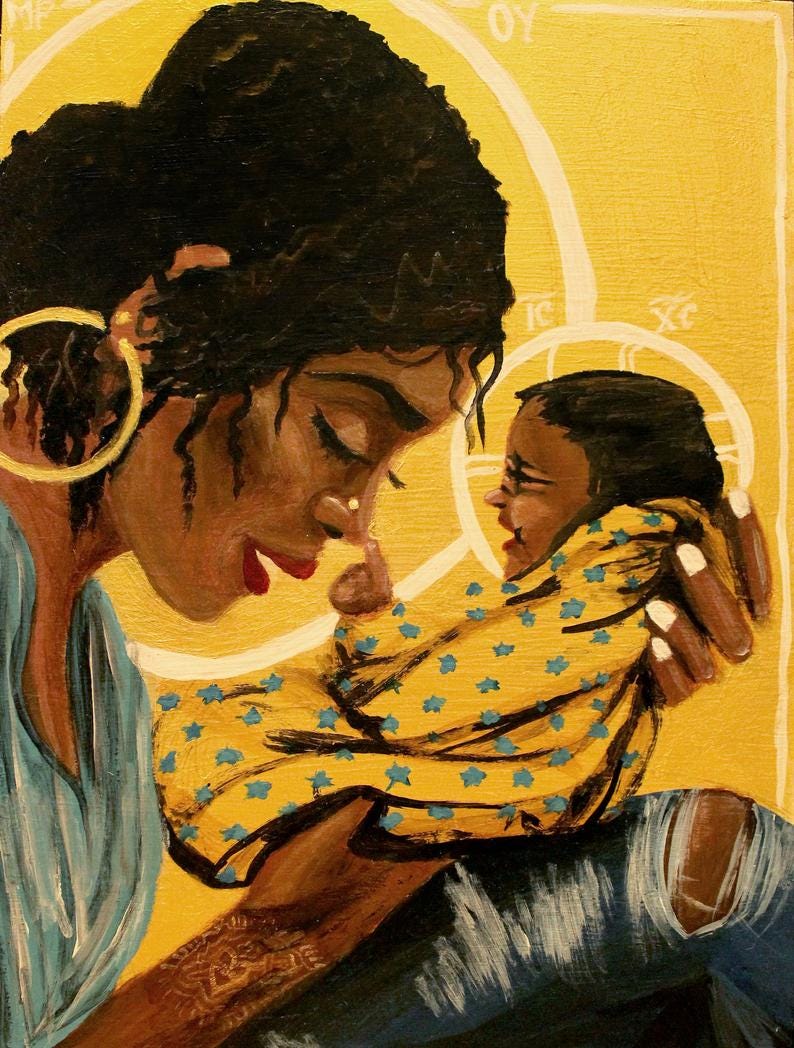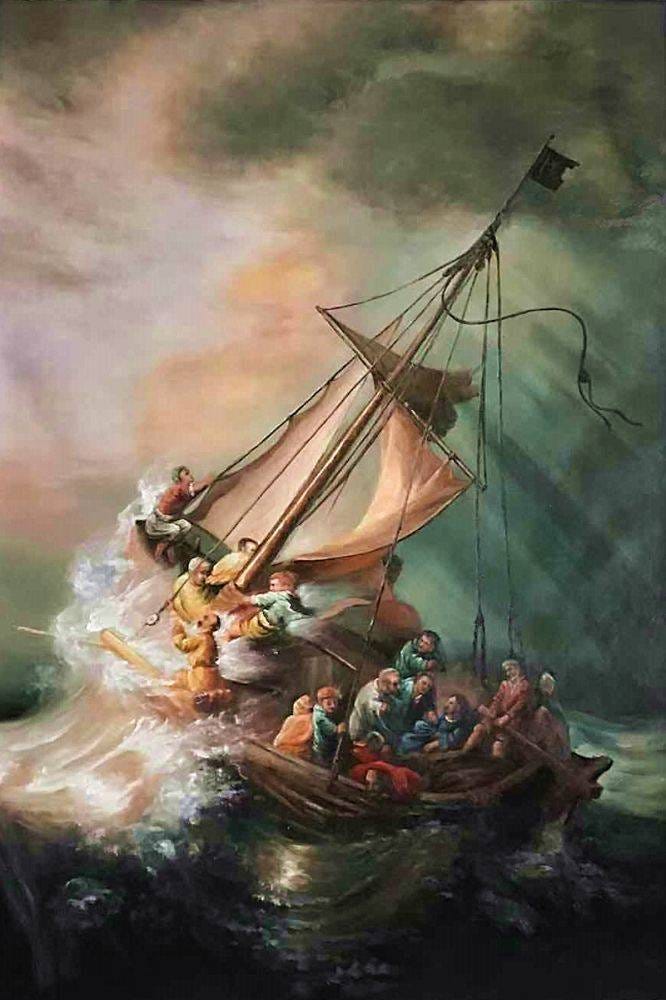This letter is free for you to read, but it wasn’t free for me to produce. If you’re interested in reading more longform essays by me + other guest posters, I would be honored if you would prayerfully consider upgrading your subscription. Full subscribers get access to our entire archives, (at least) two extra essays a month, our roundtables, our monthly booklists, my serialized book FOLLOW, and more.
Why am I doing this? I thought the other day, as I fastened a felt Valentine’s Day banner I’d snagged from the dollar section at Target to our mantle.
It was a particularly rough day in a season of rough days, and the task felt tedious. I, who am struggling to find time to meet various deadlines and clean my dishwasher filter and say a rosary and write to my school board, was instead spending a precious ten minutes changing the letter board to celebrate Valentine’s Day and making sure pink hearts were hanging in our living room.
I knew my daughter would love it when she got home from 4K. And it seemed like the kind of thing a mom would do—seasonal décor.
But also, I wanted to bring beauty and joy into the house. I wanted to take a pause from to-do lists and just make something kind of pretty.
I’ve recently found myself pausing to admire the smallest of beauties—the visual + the tangible. The perfectly hot cup of coffee on a six degree day while the frost clings to our giant windows; the pink-and-orange smear of sunrise as I drive my daughter to daycare; the soft way my other daughter’s braid falls over her pink knit dress; the way the artist of my favorite print in our home plays with light and color. I’ve been reading an obsessive amount of poetry. I practically think in poems. An I’ve begun to think that seeking, finding, and cultivating this beauty is the most important work I can do.
But the world is burning, some may say, and perhaps it is. Maybe your version of “burning” is Russia attacking Ukraine, or gender ideology in schools, or books being banned from libraries, or your son’s meth addiction, or the pro-choice legislation enacted in your state, or your recurrent string of miscarriages. Burning, of course, means different things to different people with different values + persuasions, and while I think it gives us some sort of bizarre comfort to think we’re living in the Worst Time Ever, the fact is that we’re actually living in one of the best times ever in terms of life expectancy and freedoms. That doesn’t mean, however, that life does not feel unbearably hard. The Shitstorm That Was 2020 unearthed something strange and terrible within our society that we’re still reckoning with, something that Trump was a symptom of more than a cause if we’re being honest. A fierce distrust of neighbor; an inability to sit in discomfort without numbing it or arguing with it; a desire for healing but a lack of knowledge as to where that true healing lies. This combustion has led many of us to feel deeply like we’re in some kind of battle, spiritual or otherwise.
And so, what’s the point of all of this? What’s the point of perfecting my sourdough or admiring a work of art?
“Nook” by Lore Pemberton
In 1939, CS Lewis preached to a group of students at Oxford who were living under the shadow of the upcoming war. Most of them were almost certainly going to march off to battle, and likely die. What the hell was the point of Oxford?
But Lewis, in a sermon entitled “Learning in War-time”, writes that we’re all in war every single day. For we’re all in a spiritual battle, “every moment advancing either to heaven or to hell”. As Lewis says, “To admit that we can retain our interest in learning under the shadow of these eternal issues, but not under the shadow of a European war, would be to admit that our ears are closed to the voice of reason and very wide open to the voice of our nerves and our mass emotions. This indeed is the case with most of us: certainly with me. For that reason I think it important to try to see the present calamity in a true perspective, The war creates no absolutely new situation: it simply aggravates the permanent human situation so that we can no longer ignore it. Human life has always been lived on the edge of a precipice. Human culture has always had to exist under the shadow of something infinitely more important than itself. If men had postponed the search for knowledge and beauty until they were secure the search would never have begun.” (The entire sermon is well worth your time to read in its entirety.)
Or as Paul writes in Ecclesiastes, “What has been will be again, what has been done will be done again; there is nothing new under the sun. Is there anything of which one can say, ‘Look! This is something new’? It was here already, long ago; it was here before our time.”
This could be seen as reason to despair. We’re all in some constant war? We’re in all in an epic battle, every single day, fighting good vs. evil and seeing humans wage destruction and despair on one another?
Instead, it brings me great comfort. It reminds me that even in the mist of personal and political strife, Emmanuel: God with us.
“Madonna and Child” by Gracie Mortbitzer
It would be foolish to say that Hitler’s invasion of Poland was just another day. Of course it wasn’t; it was a massive news event that prompted gigantic consequences. But in some sense, that does make it just another day. We’re all making choices every day to either engage in battle for good, or for evil.
These felt banners, simple reminders of beauty, point us towards something other than war.
For war was not God’s original design for mankind. War does not exist in God’s perfect will; it’s only there because of our human failings in the fall and in the modern world. Depression, eating disorders, troubles at work, lying politicians, racism; none of these things are actually meant to be here. They are not, in that sense, True, the way Jesus is True. They’re little-t true: factually accurate. Not big-t True: designed.
Beauty, art, poems: these things are often seen as some kind of distraction. Privilege for the wealthy and powerful. Dare I say frivolous. After all, the true Truth Bearers are in the adoration chapel or the streets. They surely aren’t staring at a mountain and trying to pull words together to mimic its glory and might. They aren’t gazing at a marble statue. They aren’t hanging up a felt banner (I’m probably making this banner sound a lot more important than it is. It was three bucks. Stick with the metaphor, guys).
But rebellion in times such as these doesn’t have to look like a poster board in a protest. It can look like beauty: forming the world to be as it was designed.
To create a beautiful space, or to admire one, is to push back against wicked forces of darkness. It’s to say that they might ruin relationships and plague bodies and destroy entire cities, but they can not turn your heart from hope to despair.
My spiritual director recently asked why I came to see him and my honest answer was that I find myself in need of reminders a lot. I need to be reminded of what’s true about Jesus. I know it, sure, but when it feels like the world is burning, as it does for so many of us, we need the holy power of reminding. That can (and often should) come in the form of a therapist, spiritual director, holy friend, wise counsel you’ve sought, etc. But in smaller doses, why can’t it come from Lord of the Rings? A painting? A pretty dish? Curtains? The woods? Your baby’s tummy in flannel footie pajamas?
In Rembrandt is in the Wind by Russ Ramsey (which I highly recommend for any wanna-be-art-fans-who-don’t-actually-know-that-much-about-art), the author writes that “so many things in our world are beautiful that didn’t need to be. God chose to make them that way so he might arrest his people by their senses to awaken us form the slumbering economy of pragmatism. That awakening is a vital function of beauty. This is the gift of beauty from an artist to their community—to awaken our senses to the world as God made it and to awaken our senses to God himself.” We have a God who allows himself to be tasted, both literally (the Eucharist) and figuratively. His response to pain and suffering, as articulated so well in Sarah Clarkson’s This Beautiful Truth, *is* beauty.
These things aren’t frivolous. They’re not less important than reading CNN. In fact, I think they’re far more important than reading CNN. They give context to a broken world and point us towards an eternal goodness that exists and is at work this very moment. To turn off the news and turn on Audrey Assad isn’t to bury our heads in the sand; we have duties as citizens to be well informed and to fight for the marginalized. But while it’s good to know what battles are going on around the world, it’s even better to know that AND to know the hands of the Creator are in all of it.
“The Storm on the Sea of Galilee” by Rembrandt
So that’s the point. That’s the point of the banner, and that’s the point of poetry, and that’s the point of a fantastic novel, an that’s the point of the Grand Canyon, and that’s the point of any of it.
That it would remind us of who and whose we are.
And oh, in these weary days, we need those reminders.
Our situation today shows that beauty demands for itself at least as much courage and decision as do truth and goodness, and she will not allow herself to be separated and banned from her two sisters without taking them along with herself in an act of mysterious vengeance. We can be sure that whoever sneers at her name, as if she were the ornament of a bourgeois past, whether he admits it or not, can no longer pray and soon will no longer be able to love. - Hans Urs von Balthasar
On My Nightstand
The Romanov Sisters: The Lost Lives of the Daughters of Nicholas and Alexandra by Helen Rappaport: Why, exactly, I chose to pick up a random book about the Romanovs when I saw it on display at the library is a fair question. But if you’re a very amateur history nerd (👋🏻), or interested in why the Russian dynasty was so obsessed with birthing boys and what it was like to be a girl when the entire world wished you were a man, I really enjoyed this read.
A Moveable Feast by Ernest Hemingway: I finally read this classic in preparation for an upcoming trip to Paris, and while Hemingway’s out-of-this-world ego just leaps off the page at every turn…you can’t deny the jerk could write. And it’s so much fun to read about his interactions with other artists in Paris at the time, like Gertrude Stein.
Professionalize the Police: I found this essay on the need for more training of our police forces, as opposed to defunding them, pretty convincing. “So I think that when we talk about professionalizing the police, it should mean exactly that: Making policing a profession rather than just a job. Doctors, teachers, lawyers, etc. all serve specialized and critical functions in our society, for which we require not just extensive training but also formalized and specialized education. I fail to see any good reason why we shouldn’t treat law enforcement as a similarly critical function, deserving of similar investments of time, money, and care.”
In case you missed these Letters:
Who Do You Listen To? - for subscribers
Woman Unfragile - for subscribers
What Did You Learn About God in 2022? - for everyone
Did you know I’ve written three books for Catholic women?
Learn more:
Girl, Arise: A Catholic Feminist’s Invitation to Live Boldly, Love Your Faith and Change the World
In Full Bloom: Finding the Grit and Grace to Thrive Wherever You’re Planted
FOLLOW: Logging Out and Leaning In (serialized for full newsletter subscribers)
This is a free edition of Letters From a Catholic Feminist, a newsletter for Catholic women looking to be inspired, informed, and intentional. If you’re a free subscriber, consider upgrading today to join our almost-1K-strong community of faithful feminists. You’ll receive (at least) two additional essays a month, as well as our entire archive + anything else we dream up. Thank you so much for prayerfully considering a subscription.










I really loved this. It reminded me of the themes in "Sea of Tranquility", that feeling that ours is the worst time yet. I've been thinking recently about when I was a teenager and hating the thought of living and struggling and being overwhelmed for so many decades. And now I'm still struggling in so many ways, but I'm so much happier and I'm able to see these struggles as just seasons. And just noticing the smallest things that bring me joy. Thank you for this beautiful reminder.
That Hans von Balthasar quote is perfection.